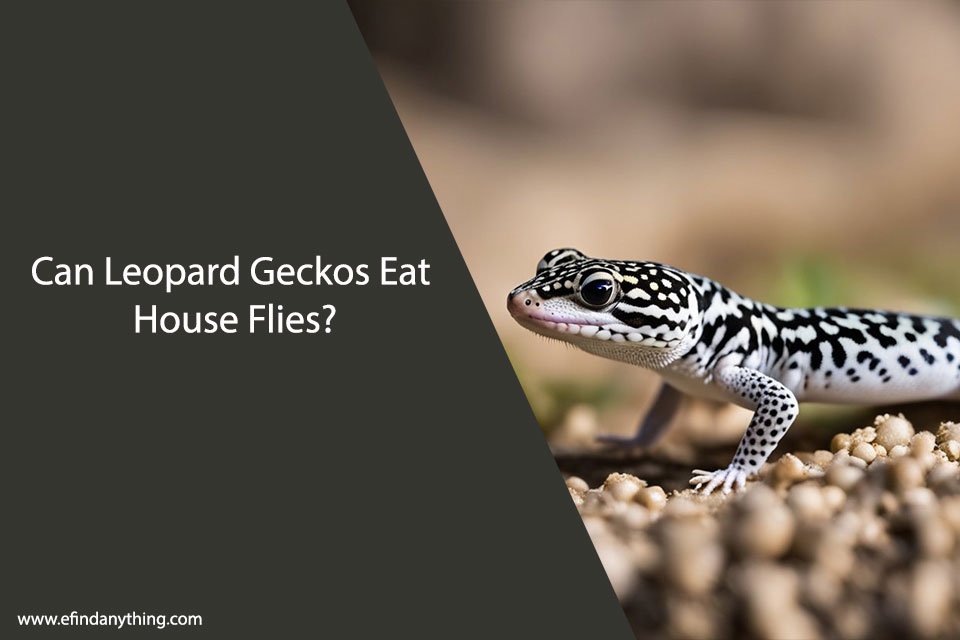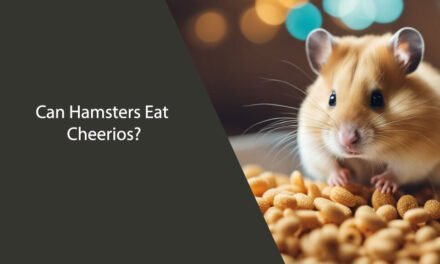Leopard geckos are a popular pet choice due to their docile nature and ease of care. As with any pet, it is important to provide a balanced and nutritious diet to maintain their health and well-being. While commercially available gecko food is a convenient option, many owners wonder if their geckos can eat other types of food, such as house flies.
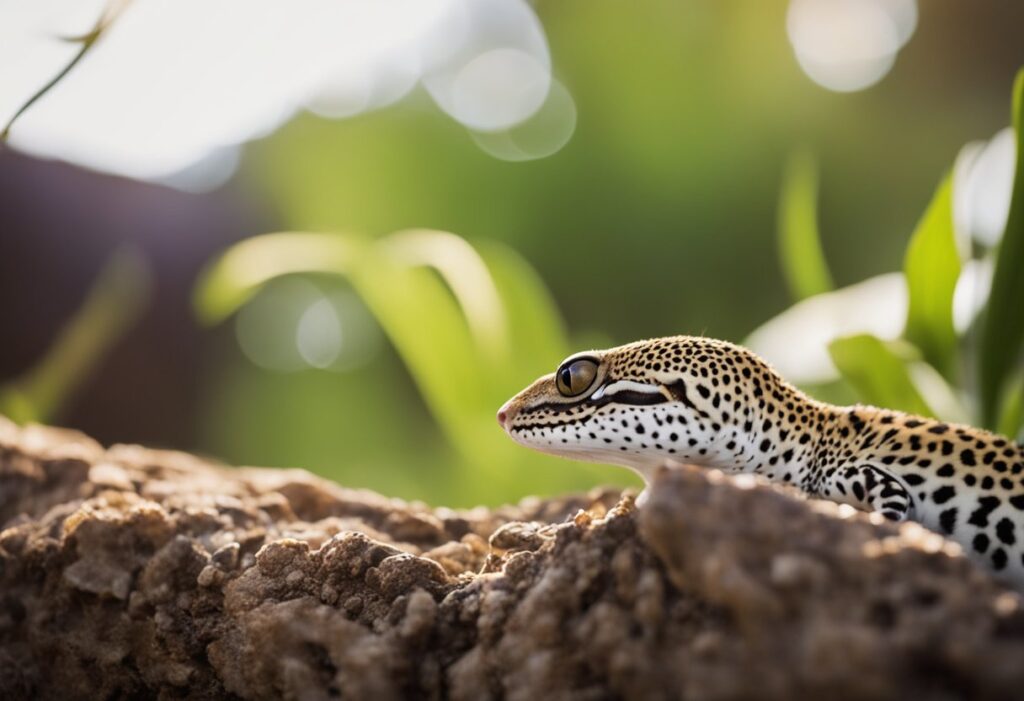
House flies are a common insect found in many households, making them a readily available food source for leopard geckos. However, it is important to consider the nutritional value of house flies before feeding them to your pet. While they do contain protein, house flies are not a complete food source and should only be given as an occasional treat rather than a staple in their diet. Additionally, it is important to ensure that the flies are free of any pesticides or other harmful chemicals before feeding them to your gecko.
Table of Contents
Dietary Basics for Leopard Geckos
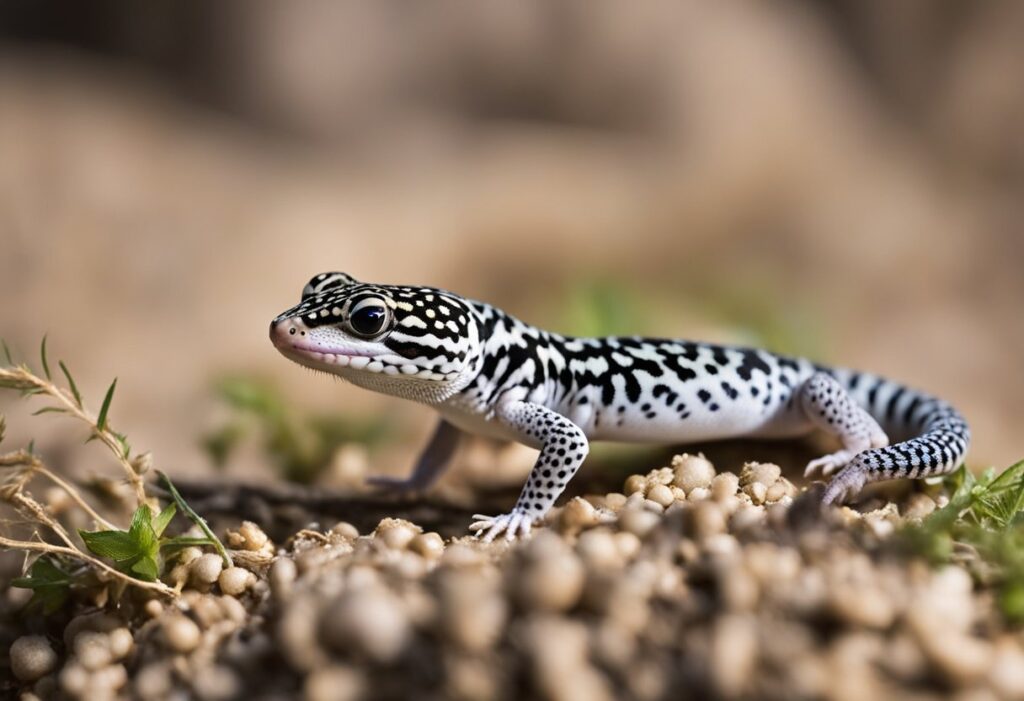
As responsible pet owners, it is important to understand the nutritional requirements of our leopard geckos to ensure that they remain healthy and happy. In this section, we will discuss the basics of the leopard gecko diet, including their nutritional requirements and common prey.
Nutritional Requirements
Leopard geckos are insectivores, meaning that they require a diet consisting primarily of insects. In the wild, they feed on a variety of insects, including crickets, mealworms, and waxworms. These insects provide the necessary protein, fat, and other nutrients that leopard geckos need to thrive.
When feeding your leopard gecko, it is important to provide a balanced diet that includes a variety of insects. This will help to ensure that your gecko receives all of the necessary nutrients that it needs to stay healthy. In addition to insects, leopard geckos also require access to fresh water at all times.
Common Prey for Leopard Geckos
As mentioned earlier, leopard geckos primarily feed on insects. Some of the most common insects that are fed to leopard geckos include:
- Crickets: Crickets are a staple food for leopard geckos and are readily available at most pet stores. They are high in protein and can be fed to geckos of all ages.
- Mealworms: Mealworms are another common food for leopard geckos. They are high in fat and should be fed in moderation.
- Waxworms: Waxworms are a treat for leopard geckos and should only be fed occasionally. They are high in fat and should not be fed as a staple food.
- Dubia Roaches: Dubia roaches are a nutritious food for leopard geckos and are becoming more popular as a feeder insect. They are high in protein and low in fat.
In conclusion, leopard geckos require a diet consisting primarily of insects to stay healthy. When feeding your gecko, it is important to provide a balanced diet that includes a variety of insects to ensure that it receives all of the necessary nutrients. By following these guidelines, you can help to ensure that your leopard gecko remains healthy and happy for years to come.
Feeding Leopard Geckos House Flies
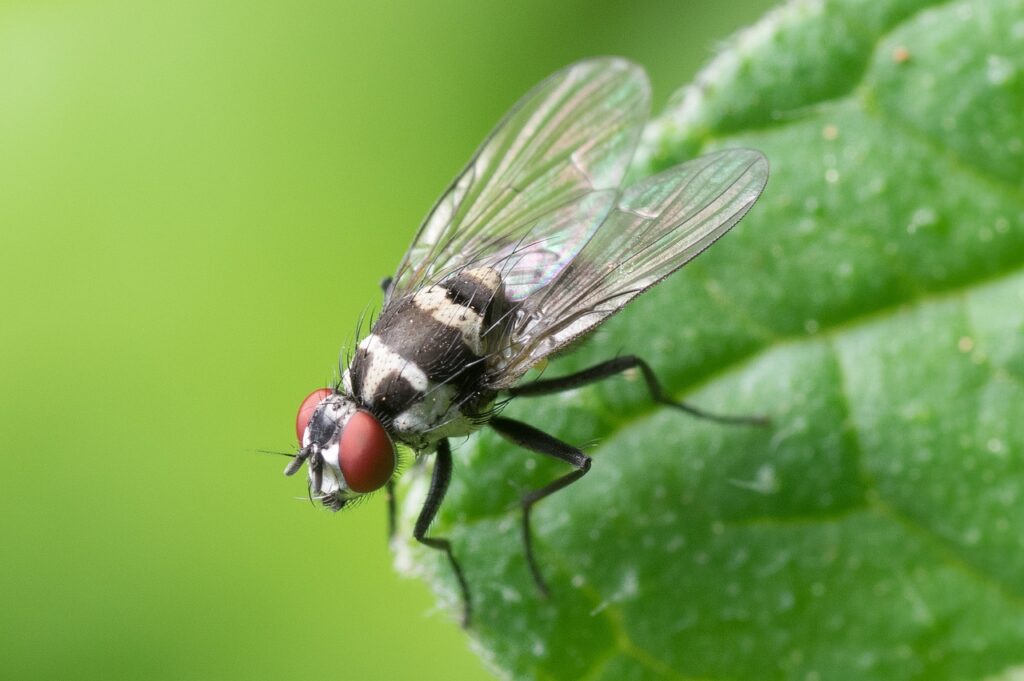
When it comes to feeding leopard geckos, there are a variety of options available. One such option is house flies. In this section, we will discuss the safety considerations, potential benefits, and preparation and feeding tips for feeding leopard geckos house flies.
Safety Considerations
It is important to ensure that the house flies you are feeding your leopard gecko are free from any harmful chemicals or pesticides. To do this, we recommend sourcing house flies from a reputable supplier or breeding them yourself. Additionally, it is important to ensure that the house flies are an appropriate size for your leopard gecko to avoid any choking hazards.
Potential Benefits
Feeding house flies to your leopard gecko can provide a variety of nutritional benefits. House flies are high in protein and can also contain important vitamins and minerals that are essential for your leopard gecko’s health.
Preparation and Feeding Tips
To prepare house flies for your leopard gecko, we recommend removing the wings and legs to make them easier to digest. You can do this by gently pulling them off or using a pair of scissors. It is also important to ensure that the house flies are gut-loaded, meaning they have been fed a nutritious diet prior to being fed to your leopard gecko.
When feeding house flies to your leopard gecko, we recommend offering them in moderation as part of a varied diet. You can offer them live or pre-killed, depending on your leopard gecko’s preferences.
In conclusion, feeding house flies to your leopard gecko can provide a variety of nutritional benefits, but it is important to ensure they are safe and prepared properly. As with any new food item, we recommend introducing them gradually and monitoring your leopard gecko’s response.
Alternative Food Options
If you’re looking for alternative food options for your leopard gecko, there are a few things to consider. While house flies can be a great addition to their diet, it’s important to ensure that they are getting a balanced diet with all the necessary nutrients. Here are some alternative food options to consider:
Commercial Diets
One option is to use commercial diets that are specifically formulated for leopard geckos. These diets can be a great source of balanced nutrition, but it’s important to choose a high-quality brand and to read the ingredients list carefully. Look for diets that contain a variety of protein sources and are fortified with vitamins and minerals.
Live Prey Varieties
Leopard geckos are natural hunters, so live prey can be a great addition to their diet. In addition to house flies, consider offering crickets, mealworms, and waxworms. It’s important to ensure that the prey is appropriately sized for your gecko and that you are purchasing from a reputable source to avoid introducing any parasites or diseases.
Supplements and Vitamins
To ensure that your leopard gecko is getting all the necessary nutrients, you may want to consider adding supplements and vitamins to their diet. Calcium and vitamin D3 are particularly important for maintaining healthy bones, while multivitamins can provide a range of essential nutrients. However, it’s important to use supplements and vitamins sparingly and to follow the recommended dosage guidelines. Over-supplementing can lead to health problems.
Overall, there are a variety of alternative food options available for leopard geckos. By offering a balanced diet that includes a variety of protein sources and essential nutrients, you can help ensure that your gecko stays healthy and happy.
Monitoring Your Leopard Gecko’s Health
As responsible pet owners, it is important to monitor our leopard geckos’ health regularly. This includes observing their behavior, physical appearance, and diet. In this section, we will discuss the signs of a balanced diet, recognizing nutritional deficiencies, and when to consult a veterinarian.
Signs of a Balanced Diet
A balanced diet is crucial for the overall health and well-being of your leopard gecko. Signs of a balanced diet include a healthy weight, clear eyes, and a shiny coat. Additionally, a leopard gecko with a balanced diet will have regular bowel movements and be active during the night.
To ensure your leopard gecko is receiving a balanced diet, it is recommended to feed them a variety of insects, such as crickets, mealworms, and waxworms. It is also important to dust their food with calcium and vitamin D3 supplements to prevent nutritional deficiencies.
Recognizing Nutritional Deficiencies
Nutritional deficiencies can occur if your leopard gecko’s diet is not balanced or if they are not receiving enough supplements. Signs of nutritional deficiencies include weight loss, lethargy, and a lack of appetite. Additionally, leopard geckos with nutritional deficiencies may develop metabolic bone disease, which can cause deformities and fractures.
To prevent nutritional deficiencies, it is important to provide your leopard gecko with a balanced diet and supplements. If you suspect your leopard gecko has a nutritional deficiency, consult a veterinarian immediately.
When to Consult a Veterinarian
Regular check-ups with a veterinarian are important for the overall health of your leopard gecko. It is recommended to schedule a check-up at least once a year. Additionally, if you notice any changes in your leopard gecko’s behavior, physical appearance, or diet, consult a veterinarian immediately.
In conclusion, monitoring your leopard gecko’s health is essential for their well-being. By observing the signs of a balanced diet, recognizing nutritional deficiencies, and consulting a veterinarian when necessary, you can ensure your leopard gecko lives a happy and healthy life.
Frequently Asked Questions
Is it safe for leopard geckos to consume common household flies?
Yes, leopard geckos can safely consume common household flies as part of their diet. In the wild, leopard geckos are known to eat a variety of insects, including flies.
What are the potential risks of feeding house flies to leopard geckos?
While house flies are generally safe for leopard geckos to consume, there are some potential risks to keep in mind. House flies can carry bacteria and parasites, which can be harmful to leopard geckos if they consume contaminated flies. Additionally, if the flies are caught in an area that has been treated with pesticides, the gecko could be exposed to harmful chemicals.
How does the nutritional value of house flies compare to a leopard gecko’s dietary needs?
House flies are a good source of protein and other nutrients that leopard geckos need to stay healthy. However, they should not be the only food item in a leopard gecko’s diet. A varied diet of insects, including crickets and mealworms, is important to ensure that the gecko is getting all of the nutrients it needs.
What is the proper way to introduce house flies into a leopard gecko’s diet?
When introducing house flies into a leopard gecko’s diet, it is important to start with small amounts and gradually increase the amount over time. This will allow the gecko’s digestive system to adjust to the new food item. It is also important to make sure that the flies are clean and free from any harmful bacteria or parasites.
Are there any specific types of flies that leopard geckos should avoid?
Leopard geckos should avoid consuming any flies that have been caught in areas that have been treated with pesticides or other chemicals. Additionally, any flies that appear sick or diseased should not be fed to leopard geckos.
Can feeding house flies to leopard geckos lead to any health issues?
Feeding house flies to leopard geckos is generally safe, but there are some potential health issues to keep in mind. If the flies are contaminated with harmful bacteria or parasites, the gecko could become sick. Additionally, if the gecko is fed too many flies or if flies make up too large a portion of its diet, it could lead to nutritional imbalances.

